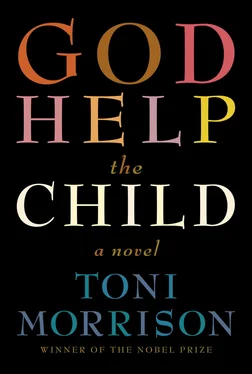“We can’t waste money like that and we can’t waste time raising it,” he said. “Besides, the people who admired and remember Adam don’t need to be reminded.”
Booker was already feeling a poisonous vein of disapproval not only from Carole, but his younger siblings as well. To Favor and Goodman it seemed Booker wanted a statue of a brother who died when they were babies. What Booker understood as family loyalty, the others saw as manipulation — as trying to control them — outfathering their father. Just because he had two college degrees he thought he could tell everybody what to do. They rolled their eyes at his arrogance.
When he visited his and Adam’s old bedroom, the thread of disapproval he’d felt during his proposal of a memorial became a rope, as he saw the savage absence not only of Adam but of himself. So when he shut the door on his family and stepped out into the rain it was an already belated act.
—
Felicity said, “Okay, sure,” when Booker asked if he could bunk at her place for a while. He was grateful for her quick response since he had no address of his own once he cleared out of the graduate dorm. On the bus back to campus reading the back issue of Daedalus he’d brought along distracted him from currying his disappointment with his family. But it surfaced powerfully when he got back to the dorm and began to throw the remnants of his college life into boxes — texts, running shoes, shapeless clothes, notebooks, journals — all except his loved trumpet. When he stopped wallowing in the self-pity of being outrageously misunderstood, he called his girlfriend. Felicity was a substitute teacher and their relationship had lasted two years primarily because there were sustained blocks of time when they didn’t see each other. Her call-ups, based as they were on the sudden illness of a permanent teacher, were irregular and often to distant districts. So he felt comfortable asking whether he could move in for a bit since both knew it was about convenience and had nothing to do with commitment. It was summer, and since Felicity would probably have no requests for substituting, they could enjoy each other’s company without deadlines: go to movies, eat out, run trails — whatever they felt like.
One evening Booker took Felicity to Pier 2, a run-down dinner-and-dancing club that boasted a live combo. Over the shrimp and rice Booker thought, as he often did, that the quartet on the little stage needed brass. Virtually all popular music was saturated with strings: guitars, basses and piano keys aided by percussion. Other than the big-star musicians like the E Street Band, or Wynton Marsalis’s orchestra, groups seldom featured, in backup or solo, a sax, clarinet, trombone or trumpet, and he felt the void intensely. So this evening at the break he went backstage to the narrow dressing room full of weed smoke and laughing musicians to ask if he could join their group sometime. Not wanting to cut their earnings with another player, especially one they didn’t know, they dismissed him quickly.
“Go to hell, man.”
“Who let you back here?”
“Well you could at least hear me,” he pleaded. “I play trumpet and you could do with a horn.”
The guitarists rolled their eyes, but the drummer said, “Bring it to the Friday set. That’s when it won’t matter if you screw up.”
He didn’t mention his future audition to Felicity. She couldn’t be less interested in his trumpet playing.
Booker did as the drummer suggested, trying out before them in the dressing room with as close as he could come to a Louis Armstrong solo. The drummer nodded, the piano player smiled and the two guitarists had no objection. From then on during the summer Booker joined the group calling itself The Big Boys on Fridays, when the place was so crowded the drinkers and diners paid no attention to the music.
When in September The Big Boys broke up — the drummer moved away; the piano player got a bigger, better gig — Booker and the guitarists, Michael and Freeman Chase, began to play on streets dappled with homeless veterans with cold fury in their eyes. Their anger was not dampened by the fact that they got more generous offerings by being surrounded by music. It was the sweetest season of Booker’s life but it didn’t last. By the end of summer the relationship with Felicity had frayed beyond any stitched-up remedy. They had enjoyed being roommate lovers the whole summer before each began to annoy the other with habits they had not previously paid close attention to. Felicity complained about his loud trumpet practice and his refusal to party every single night with her friends. He hated her cigarette smoke, her choices of take-out food, music and wine. In addition to insisting on constant visits from members of her family, she was nosy, forever prying into his life. Most of all he found her to be insufferably opinionated. In fact Felicity found him as unpleasant and annoying as he found her. She believed she might lose her sanity if she had to listen one more time to Donald Byrd or Freddie Hubbard or Blue Mitchell or any of his other favorite musicians. She began to regard him as a misogynist loser. Nevertheless they might have stayed together, in spite of the mutual hostility that was growing like mold between them, except for one event: Booker’s arrest and the night he spent in a holding cell.
He had passed a couple, parked near an empty lot, taking turns sucking on a crack pipe. The sight was of no interest to him until he noticed a child, maybe two years old, screaming and crying while standing in the backseat of the crackheads’ Toyota. He walked over to the car, yanked open the door, dragged the man out, smashed his face and kicked away the pipe that had fallen to the ground. Then the woman jumped out and ran to help her partner. The three-person fight was more hilarious than lethal, but it was long enough and loud enough to get the attention first of shoppers, then the police. All three were arrested and the little screaming girl given to childcare services.
Felicity had to pay the fine. The judge was lenient with Booker because the crackhead parents disgusted him as much as they did Booker. He arraigned the couple and issued a disturbing-the-peace ticket for Booker. The entire incident enraged Felicity who wondered aloud why he meddled in things that didn’t concern him.
“Who do you think you are? Batman?”
Booker fingered his right molar to see if it was loose or broken. The female had had more strength than the man, who swung wildly but never got in a hit. It was her knuckles that connected with his jaw.
“There was a little kid in that car. A baby!” he said.
“It wasn’t your kid and it wasn’t your business,” shouted Felicity.
A mite loose, decided Booker, but he would see a dentist anyway.
On the bus home each knew it was over without saying so. Felicity continued nagging for an hour or so after they arrived at her apartment, but up against Booker’s leaden silence, she quit and took a shower. He didn’t join her, as had been their practice.
Booker’s work history was thin — one embarrassing and disaster-ridden semester teaching music in a junior high school, the only public school teaching he could do since he had no certificate, and he was cut from the few music auditions he signed up for. His trumpet talent was adequate but not exceptional.
His luck changed at the precise moment it needed to when Carole tracked him down to forward a letter addressed to him from a law firm. Mr. Drew had died and to everyone’s surprise he had included his grandchildren — but not his own children — in his will. Booker was to share the old man’s constantly-bragged-about fortune with his siblings. He refused to think about the greed and criminality that produced his grandfather’s fortune. He told himself the slumlord money had been cleansed by death. Not bad. Now he could rent his own place, a quiet room in a quiet neighborhood, and continue playing either on the street or in more little rundown clubs. Having access to no studio, the men played on corners. Not for money, which was pitiful enough, but to practice and experiment with one another in public before a nonpaying, therefore uncritical, undemanding audience.
Читать дальше











